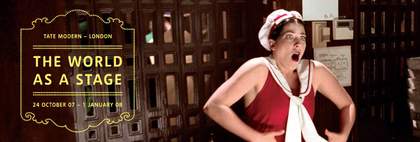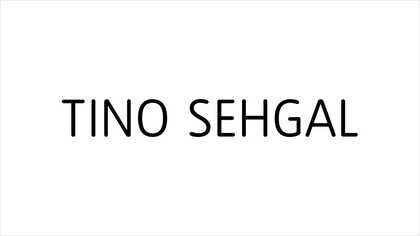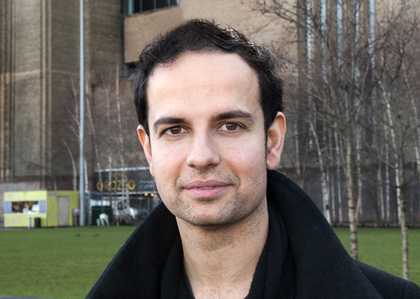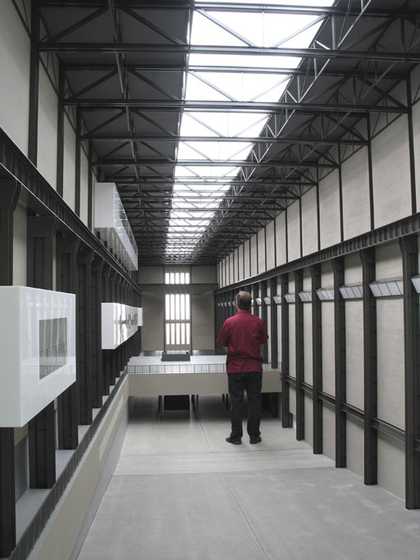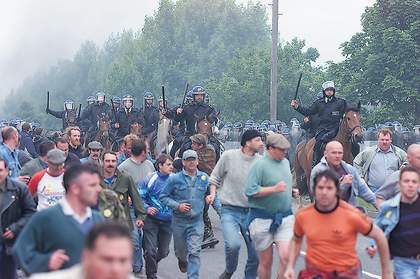
Jeremy Deller
The Battle of Orgreave 2001
Colour video
Still frame
Photo: Martin Jenkinson © Artangel
The distinction between the theatrical and the real in contemporary life has atrophied drastically over the past decades. What meaning does the title The World as a Stage have for you now?
Markus Schinwald
I think that this atrophied distinction is true not only for the present, but also for the past; think only of historical etiquette or religious practice. The title has long been prevalent, but I believe it holds a special interest now in contemporary art. The focus on the theatre has probably to do with themes, such as pathos, that were not particularly inherent in art in the past couple of years and which have been nourished by a renaissance of bourgeois ethics.
Mario Ybarra Jr.
The world as a stage translates for me as an artist into the world as a studio, meaning that all of my activities – from walking through markets to driving down the road – are integral parts of my production: to understand that everyday we are performing on every level and we are always in a costume, even if it is the anti-costume.
Jeremy Deller
I always thought the quote was ‘the world is a stage’. The fact that we are showing next to a 400-year-old theatre I find intriguing. It might be interesting to make a piece at the Globe… but I’m getting distracted. I think people have been showing off forever, it’s a part of human nature, we are drawn to the theatrical and spectacular, we can’t help ourselves.
Geoffrey Farmer
At first I read it negatively, a type of claustrophobia, the dwindling space of what we might conceive as the possibility and power of “the authentic gesture”. But this is a kind of reactionary thought, and in thinking of it more, perhaps it is a question about use.
How important are ideas of staging and participation in your work?
Tino Sehgal
Very.
Jeppe Hein
Most of my installations offer the viewer the possibility to participate in the action of the piece, to interact with the work, the space and other visitors. More than that, my artworks often surprise the audience and confront them with the unexpected. Sometimes the viewers find themselves in a situation of interaction against their will. Thus, instead of passive perception and theoretical reflection, the visitor’s direct and physical experiences and very important to me.
Ulla von Brandenburg
Participation is very important. I stage people in my tableaux vivants, I film them, but they are not moving. I show them in an unpersonal way – you don’t hear them speaking, you don’t see what kind of movements they make. For these films I asked the people around me to participate, my friends, my studio neighbours. In the one hand, I know them, I know how they look, I have a feeling for them, and so it is easier to control the content of the film. On the other hand, I am showing my clique, my entourage, my nearest or my possible nearest, a potential secret society.
Markus Schinwald
Somehow the idea of staging in itself is a little too general. In a way everything is staged. The main difference for me between an exhibition and a performance is the immediacy. In a performance, the audience agrees to watch something together while it is being made. In an exhibition, usually the work is already done when the audience get to see it. Of course, there are exceptions.
Mario Ybarra Jr
Staging and participation are very important to my practice. I feel that the work doesn’t begin until a living, breathing audience is engaged with it. It should go home with them and enter their lives. When Karla [Karla Diaz, Ybarra’s partner and collaborator] and I were running Slanguage [a community-based workshop-cum-studio in Los Angeles] I would get people who wanted to do studio visits to come over, and they would walk in expecting to see drawings or something on the wall that looked like art. They would look at the walls with disappointment and ask: ‘So what are you working on?’ And I would have to reply: ‘You are breathing it.’ The work was the studio, everything in it, the people involved in workshops, the neighbours, etc. So people are an actual and vital part of the entire work; without them it is not done, they are the catalyst.
Jeremy Deller
The two things are connected – staging enables participation.
Geoffrey Farmer
Literally, participation is not so important, although I aspire to engage people. I think this is done through different means, one being the staging of the work.
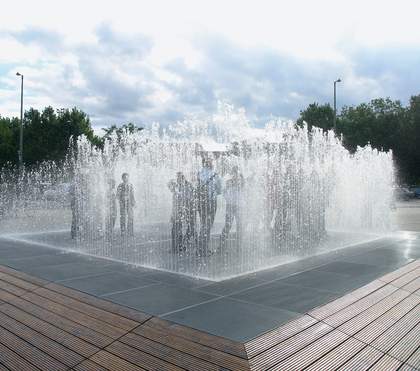
Jeppe Hein
Appearing Rooms 2004
Variable dimensions
Installation view
© Courtesy T Johann Konig, Berlin. Photo: Ludger Paffrath
At Tanz in Berlin
Is the idea of a cross-disciplinary practice relevant to the way in which you work?
Rite McBride
In a way I don’t think this applies to me, but if using the language of architecture and design and sculpture us cross-disciplinary, then okay. Arena was originally produced in 1997 as an alternative structure for cultural activity. I employed design innovations from the moment (Nike training shoes and Trek racing bikes and the general use of high-tech materials with buzzwords such as light and strong) to arrive at the form of Arena. Conceptually, I was employing architecture of the largest civic dimensions – stadiums as potential mirrors of society; empty or full of people, they embody the essence of population.
Tino Sehgal
No.
Markus Schinwald
Well, I don’t really know if what I do is cross-disciplinary. I do work with different media and fields, but I noticed that I often failed to satisfy the audience of the field I entered into. For example, I did a sitcom taping (Exceptions prove the rule) in a dance context a while ago and really pissed off some of the dance audience. The only people who didn’t have problems with the piece were the ones that had a background in the visual arts. For me, cross-disciplinary also means succeeding in the world one enters into.
Jeremy Deller
When you don’t have technical skills you survive by your wits. So you use whatever is at hand, and that will inevitably be cross-disciplinary, if only by chance. Also, I am not a controlling person, and I tend to lose control of certain works quite early on.
Geoffrey Farmer
When I was in art college in Vancouver, I studied in the newly formed interdisciplinary department, which offered courses in 4-D and had classes devoted to concepts such as ‘the total work’ and ‘the fourth wall’. It seemed relevant at the time to define a working process as being cross-disciplinary, but I think now it is more important to discuss other aspects of a practice.
What does the notion of theatre mean to you, and does it have relevance for your practice as an artist?
Rite McBride
Strictly speaking, the theatre has very little to do with my thoughts and activities as an artist. Theatricality is, however, central to my observations and impetus to produce art. Specifically, theatrical architecture (not just stadiums) often reveals essential qualities of a socially relevant nature, formalising and exaggerating human activity and desire.
Tino Sehgal
Theatre belongs to antiquity in the way that exhibitions belong to our times. Theatre addresses us as ‘the people’, as a collective, while the exhibition addresses us as individuals. The fact that theatre was the dominant ritual form of antiquity and the exhibition is the dominant one now is one of the many indicators that the process of individualisation, or rather a consciousness of oneself as an individual, has accelerated. Then, one was first of all a member of the people, which is reflected in being part of the audience; today I am first of all just simply myself, an ‘I’, which is reflected in the fact that in the exhibition I am not part of some larger whole, I am a visitor. The other notion that the format of the exhibition celebrates is, of course, the material object. This relates to a soon-to-be or already-gone era, the industrial society, which is focused on and derives its (material) wealth from the transformation of the earth’s resources into objects. As this era dies out, the new ritual (we don’t know if it will still be called ‘exhibition’) will most probably be one that celebrates the notion of the individual, but not any more the material object, rather the production of an inter-subjective wealth.
Roman Ondak
I like theatre as a phenomenon that we have created for us to observe life staged. I like its straightforwardness – it doesn’t use any additional medium for mediation between itself and spectator, just a stage, movements, gestures, language. That’s what we all do on a daily basis, being a part of many stages – in apartments, offices, restaurants, streets. I believe an exhibition is a stage of the same sort, that’s why it gives endless opportunities to fill it with meanings.
Jeppe Hein
Although I do not directly refer to theatre, I think my artistic practice has something in common with a performance on stage. Even though plays are restricted by rules as well as specifications in form and content, allowing only limited space for boundless activity, the actor is always free to decide if he wants to take an active part or not. My installations offer people a stage for performance, a platform for interaction with the artwork, other visitors and the space. My water pavilions, for example, can be interpreted as staged where people can experience and respond to the artwork, adopting the position of wither the actor or the audience. But in contrast to the classical theatre, everyone is invited to perform as an actor or as audience in the play.
Markus Schinwald
I have worked in the theatre since I was a child and it has had an influence on me and my work, whether I wanted it to or not. But I have a very destructive relationship to theatre – I am obsessed by the idea of hurting it.
Ulla von Brandenburg
With theatre it is clear who is watching and who is being watched. There is a line between stage and audience – it can be a curtain to emphasise the beginning and end of what we are watching. It is very relevant to my work. I like it if the spectator has the free choice to enter into the piece if they really wish. I like theatre as a construction. I like replayed things, roles, movements, patterns, repeated words and sentences, reanimated feelings. Somebody on a stage can be an example of your self. You have a choice between empathy and distance.
Mario Ybarra Jr
The notion of theatre means to me that artists can create content with the players and a context with the set. This is intriguing because as artists we are usually trained only to create content for galleries and museums, not the context or the environment in which works are presented. In theatre, as a context creator you can give the audience more things to form relationships with to tell a story. A simple prop such as a chair can totally change the way a player or actor engages with the stage. In the same way, I feel an audience member in an installation can move and react to the story an artist is trying to convey.
Jeremy Deller
In most obvious terms theatre means to me something that I never go to, even though I know I should. In traditional terms ‘theatre’ has little impact on my work, only as a counterpoint to what I want to achieve. I have a problem with actors in that they are often fairly unconvincing, in the same way that I see a lot of better art made by people who would not necessarily see themselves as artists.
Geoffrey Farmer
Theatre simultaneously fascinates and repulses me, although I have always been interested in its notion, the idea of theatre and what has been written about it, especially the counter-traditions, which I have always found really inspiring.
Cezary Bodzianowski
It means everything and nothing. I prefer nothing. It doesn’t have any relevance for my practice as an artist, because I’ve never been an artist; maybe in the future [I will be].

